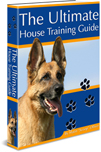 Getting a dog is a very tedious undertaking and requires a lot effort, time and money. Choosing the right dog breed, finding a reputable dog breeder, getting tips on buying a dog, researching on what needs to be done to take care of the dog, all of these things are important to become a responsible dog owner. But the real job hasn’t started yet. It starts the moment your chosen puppy gets to your home. There’s still a lot of thing you need to learn for your beloved dog. Above all, the first thing you need to do is to train your dog how to relieve itself - toilet training, house breaking, paper training, potty training or whatever you want to call it.
Getting a dog is a very tedious undertaking and requires a lot effort, time and money. Choosing the right dog breed, finding a reputable dog breeder, getting tips on buying a dog, researching on what needs to be done to take care of the dog, all of these things are important to become a responsible dog owner. But the real job hasn’t started yet. It starts the moment your chosen puppy gets to your home. There’s still a lot of thing you need to learn for your beloved dog. Above all, the first thing you need to do is to train your dog how to relieve itself - toilet training, house breaking, paper training, potty training or whatever you want to call it. Imagine your expensive, imported, treasured carpet being soiled by your beloved puppy… OMG. You might forget what you have just been through to get him. All the time, effort and money – you wished you never had a dog. Don’t get frustrated; this is where the fun begins. Just like a baby, you need to train your puppy how to relieve itself, “to do its business.” Your new family member may already have received some basic house training even before you get him. If not, you should start immediately. Remember that what goes in the dog must come out. At 8 weeks old, he will do it half a dozen times a day. It is now up to you to specify when and where he should do his business.
House breaking should not be confused with paper training, wherein one teaches the dog or puppy to relieve itself inside the house on papers spread on the floor. Moreover, house breaking is defined, as teaching the dog to do its business outside, either in the street or backyard. Therefore, the simplest and easiest approach in house breaking your dog, starts with the following techniques.
- Begin always with a regulated diet. However, do not limit your dog’s intake of food and water, but rather regulate the number of feedings, say once to adult and three to four times to puppies.
- Try to break the day up, as close as possible into three equal parts, where you have to get the dog on the leash three times a day, and walk it out on the spot or “scent post” where you want it to relieve itself.
- Remember that whenever the dog sniffs and finds interest on that particular spot, eventually it will urinate and defecate there.
- Whenever it relieves itself on that spot, a treat should be given, or simply praising it, if you don’t have the treat.
It is important to give the rewards the moment it has finished relieving itself. As a result, it is going to associate relieving itself outside with getting a reward. Consequently, it will start looking forward to it. Furthermore, the anticipation of receiving the reward will make it eager and tend to do business quickly or become excited. Repeat the same procedure all over for at least two months training period. Repetition and consistency is needed in order to succeed in this endeavor. It will happen that your dog will have accidents, do not physically punish your dog. Doing so will not correct the problem as it cannot associate being reprimanded for a past occurrence. Never hit or rub his nose in his excreta, it will do more harm than good. If you happen to catch the puppy “in the act” of doing it inside the house, do not shout. Instead, gently distract it and quickly pick it up (for small dogs) or get a leash to bring him to the designated spot. Give it a praise or reward after the correction. Don’t forget to pick up after your puppy and put the poop in the trash.
Instead of learning to go outside, the dog can be trained to use a specific area inside the house to relieve itself. This area of course is covered with papers, hence the term “paper training.” Again, the technique is the same as housebreaking. Moreover, it is a common mistake to teach the puppy initially on paper training, with the real intention of house breaking it later. The puppy will be confused. If you want your dog to be housebroken, for the rest of its life, DO NOT PAPER TRAIN IT. Nevertheless, if you are prepared to accept that you will use newspaper anytime it want to relieve itself or at the same time relieve itself outside the house, then this procedure or approach is all right.
Begin by selecting the place where you want the dog to do its business indoors. Cover the specific area with sheets of newspapers. The area should be some distance away from it sleeping and feeding area, as a puppy will not do it near its feeding place. When you change newspapers, bottom papers should be placed on top of the new ones. This is to reinforce the puppy’s association with the scent of the old papers. Remember to praise the puppy abundantly after he has made use of the same area.
There will be times (lots of them) that your dog will fail and even properly housetrained dogs will fail. Try to figure out why the dog had an accident, or minor failure. Many housebreaking failures occur because of a change in the dog’s feeding or walking schedule. Emotional upset too can be caused by some changes in the dog’s life, is one of the most common reasons for a failure. As these problems develop, as a consequence of anxiety, fear, nervousness or confusion. Other specific causes may crop up as follows:
- Too much water – if a dog being housebroken has access to water all day and night, it will drink many times and urinate often.
- Lack of confinement – dogs cannot maintain body discipline if they are given the freedom to wonder all over the place (house) whenever they are left alone.
- Changing diets – sometimes if you change from one dog food brand to another, the changes will cause stomach upset, leading to diarrhea.
- Medical reasons – a dog with kidney problem, bladder infection, intestinal parasites, diabetes, colitis, etc, will be unable to participate in a housebreaking program.
After knowing the reasons for these failures, try to eliminate or correct the deficiency. Re-train the dog if necessary. Common sense will guide you when to stop the training program.
The key to successful housetraining is persistence, lots of patience and praise. Just like a baby, give your puppy time to learn. You wouldn’t hit your baby for soiling his diapers, would you? Don’t EVER hit your puppy. The only thing he will learn from physical punishments is to fear you and that will only make future training sessions more difficult.
Oops! This is now becoming very long…
More dog training article on my next post… watch out for it.
Get more dog articles by subscribing to Dog Lover.

















